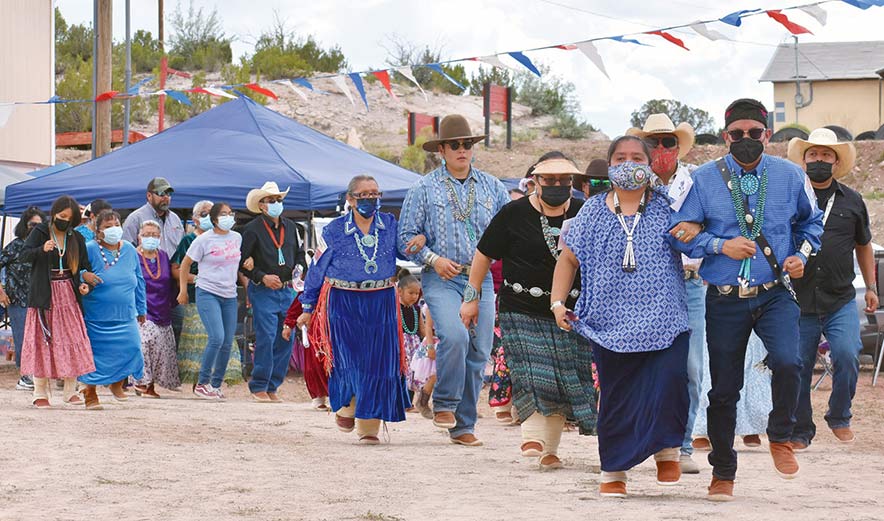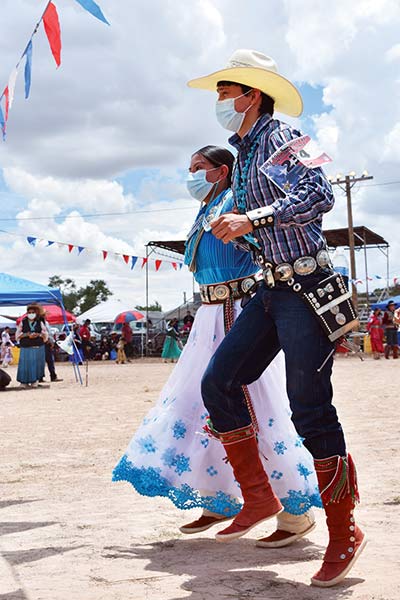
Harmony and blessing: Song & dance brings healing after COVID-19

Navajo Times | Rima Krisst
Despite the heat, relatives of all ages and from different parts of the Navajo Nation joined together for the festivities at the July 4th Song and Dance arena in Window Rock.
WINDOW ROCK
The Annie Wauneka Song and Dance arena was the place to be at the Fourth of July fair in Window Rock last weekend for fun, kinship and stepping on the path of recovery from the COVID-19 pandemic.
Traveling from all parts of the Navajo Nation, hundreds of Diné singers and dancers of all ages, dressed in their finest traditional attire, reunited with friends and family that they might not have seen for over two years.
“It’s so beautiful to be back out dancing and having fun after having been away from each others,” said Diné language and culture educator and candidate for president Dolly Manson.

Navajo Times | Rima Krisst
Penelope Joe and Milton James dance in unison at the Song and Dance in Window Rock.
“I finally feel whole again with all the people of all ages from different walks of life dressed up, happy and celebrating,” said Manson. “Dancing, singing just brings us all full circle and to feel good again.”
Ryland Lee of the Tó Nílí Singers said, “It’s the road to healing and I’m glad that we’re back!”
Albert Chase, founder of Diné Pollen Trail Consulting from Looking Horse, Ariz., said returning to the song and dance was just what he needed to restore body and soul.
“You could feel the power of the drum and the singing,” said Chase. “It was a very healing moment for me. I haven’t been to my own traditional song and dance for a long time. Being part of that circle, it was really, really good.”
An afternoon downpour of monsoon rain was also a welcome sign, he said.
“It was confirmation that it was a good day to be together,” he said. “We saw a very sacred connection between our Mother Earth and our Father Sky.”
Chase said he could see in the faces of the elders that they were very content to be socializing, expressing themselves and dancing for their health.
‘A healing process’
“We’re like one big family here,” said Nataani Nez singer Roy Etcitty. “I feel enlightened, like walking on air. It’s good to be among the people, shaking hands with your relatives. We haven’t seen each other for so long.”
The uplifting nature of song and dance is also a good boost for the immune system, said Etsitty.
“It brings your health back up,” he said. “We sing about the birds, the clouds, the sky, the earth. Everything we do here represents something in our life.”
However, Etcitty said he gets emotional when he looks out at the crowd and realizes that someone is missing.
“Sometimes you have tears in your eyes,” he said. “I wish they were all here. This is a healing process now.”
Many singers, dancers and speakers expressed sadness as they remembered relatives who were lost to the pandemic.
“It’s so heartbreaking that some of them can’t be here today – some of them passed on,” said dancer and artist Penelope Joe from Wide Ruins, Ariz.
But at the end of the day, everyone has to stay strong and come back together, she said.
“We’re all strong Diné people and I know that they would want us out here today to keep on dancing and enjoying our Navajo culture,” said Joe. “That’s why I had to be here.”
Joe, who is the great granddaughter of Annie Dodge Wauneka, said through her participation she also wants to help teach youth Diné culture and language.
“I want to inspire the youth to do song and dance and love their culture and experience it,” she said.
‘Heal each other’s hearts’
Announcer and master of ceremonies Derrick Sloan from Tuba City said now is the time for rejuvenation.
“Looking at the elders and the younger generation, it’s very emotional for them,” said Sloan. “Pretty much they lost the connection, the kinship, so they’re happy to be back and carry on the traditional values of being a Diné person through their songs, their prayers and the traditional teachings.”
Tylee Tom of the White Valley Singers, who is a popular youth social media figure, described being at song and dance as liberating and bringing “good thoughts.”
“It’s really good for your mental health, especially since we’ve been at home by ourselves, not seeing anybody,” said Tom. “Now, we finally get to reconnect with some of our loved ones, our relatives, our friends and remember those who have passed… It’s a good blessing.”
Tom said events like the song and dance also gives youth the opportunity to learn from the elders present.
“You can actually go around and talk to these elders and ask them questions,” he said. “It’s just a matter of communicating with them and your willingness to go out there and collect these teachings, because some of these elders are open to share their knowledge.”
Attendee Bryan Manycattle also said he was glad to be back at song and dance after two years of “staying home and staying safe.”
“It’s good to see our elders and friends and hearing the songs and seeing everybody in their Navajo traditional outfits,” he said.
Manycattle, who drove in from Utah, said even high gas prices won’t deter those determined to reunite at song and dance.
“They all come a long ways from across the Navajo Nation to be here,” he said. “I came here to be part of our song and dance family, good harmony and blessing.”
At the same time, he said, everyone is missing family and friends who have passed on.
“Through the song and dances and coming together, that pretty much keeps us going,” said Manycattle.
“We always look forward to being with people we know,” he said. “I know all of us will have fun and heal each other’s hearts.”
‘Everything is positive’
Tyrell Jim, a singer with Tó Nílí Singers from Little Water, New Mexico, said the song and dance is especially healing for the elders at this time.

Navajo Times | Rima Krisst
Trey Etcitty and his niece LacyRose Etsitty pair up for the Song and Dance on a hot summer’s day.
“This is primarily their way of getting exercise and has mental health benefits as well,” he said. “That went away with Covid – we’re really grateful to see those who are here with us today.”
Before Covid, there used to be a song and dance almost every weekend, said Jim.
“It’s really important that we get back out here and continue on,” said Jim. “We’re always really happy when we see the younger ones out here with us as well. This is something to be proud of.”
Sloan said even though the song and dance is considered a social dance, the songs bring healing for everyone.
“When you see the crowd out there participating and dancing to the songs, you’ll see the energy of the environment,” he said. “Everything is positive. They’re just here to enjoy themselves.”
He said even though some elders sadly passed from Covid, the good news is their teachings will be carried on through their children and grandchildren.
“That’s where we come in and we try to teach our younger generation that this is what balances the life of the Diné individual through the knowledge, through songs and prayers,” said Sloan. “It heals the individual in its own mysterious ways.”
‘Our roots’
Melissa Stash of the Sunset Juniors, a family singing group from Blanding, Utah, said the songs also offer protection and keep everybody strong and motivated to keep going.
“It’s really good that we get to bond back together with our elders and our relatives,” said Stash.
“It makes us feel happy and strong, knowing that they’re here for us,” she said. “They are our roots.”
Isaiah Tom Tsosie of the Little Boy Blue Singers from Coyote Canyon said it has been a painful year because his grandmother “Ethel” recently passed on.
“She was very involved with song and dance and she would dress up from head to toe and get here early in the morning,” said Tsosie.
“It’s very emotional because we don’t see her out on the dance field,” he said. “We don’t see her standing next to us while we’re singing and her encouraging us to keep singing.”
To help cope with the loss, Tsosie said the Little Boy Blue group has made it their goal to keep their grandmother’s songs and memory alive.
With many of the knowledge holders having left the world, Tsosie said it’s now up to the youth to keep their traditions going and to bring “harmony and beauty” onto the dance floor.
“As part of the damage that we face, the best thing we can do now is to keep moving forward through our teachings, our beliefs, to keep us very strong, internally and externally, with grandmother and grandfather’s prayers that have kept us going,” he said.
Tsosie said it’s up to each individual to keep doing more for their families and communities and always carry on the teachings and traditions that were passed down from the elders.
“It’s all about having fun and keeping that kinship in place between one another,” said Tsosie.
“Our songs and our dancing is what makes us tough,” he said. “It’s what brings beauty back to everything, and what brings us back to 100 percent as an individual.”
As a public service, the Navajo Times is making all coverage of the coronavirus pandemic fully available on its website. Please support the Times by subscribing.
How to protect yourself and others.
Why masks work. Which masks are best.
Resources for coronavirus assistance







 Highway 264,
Highway 264, I-40, WB @ Winslow
I-40, WB @ Winslow